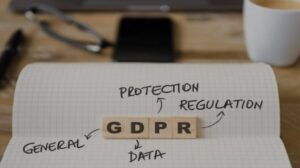Online Advertising Privacy
Online advertising privacy garners significant attention in today’s digital landscape. The focus centers around the exchange of data between companies and consumers. On the one hand, personalized ads prove crucial in driving business growth. On the other hand, they draw concerns over the invasion of personal privacy.
Key Concepts of Online Advertising
Online advertising involves the use of various platforms and technologies to promote products and services.

Marketers leverage user data to deliver personalized advertisements, driving engagement and increasing conversion rates.
The data collection process, however, is two-pronged – while it aids in tailoring ads, it also brings forth privacy concerns.
- Targeted Advertising: Businesses collect user data to deliver ads that align with personal interests. For instance, a company selling athletic gear may target individuals who frequently visit health and fitness websites.
- Cookies: These small text files store information about user behavior on websites. They assist in creating user profiles that aid targeted advertising.
- Third-Party Data: Often, businesses buy data from other companies to enrich their customer profiles. This process amplifies the effectiveness of their advertising campaigns.
Privacy Concerns in Digital Advertising

While online advertising has underscored business growth, privacy concerns often accompany its progress.
These concerns predominantly spring from the collection and use of personal data.
- Data Collection: The process of gathering user information can prove intrusive. Cookies track user activity across different websites, creating extensive profiles that some deem invasive.
- Data Usage: Companies often use data without explicit user consent, raising ethical questions.
- Data Theft: Breaches and hacks pose severe risks, with malicious parties seeking to exploit collected data. For example, in 2013, data of roughly 3 billion Yahoo accounts was compromised, clearly demonstrating the hazards of data collection.
The Evolution of Online Advertising Privacy
As online advertising grew in the late 1990s and early 2000s, major privacy issues surfaced. Behavioral targeting by using cookies to monitor user activity became a standard practice. Businesses harvested information from millions of web users, gaining insights into their behaviors, interests, and online habits. For instance, “DoubleClick,” a pioneer in online advertising, faced extensive criticism when it acquired “Abacus,” a catalog data compiler, in 1999. Their intention to cross-reference online and offline data raised serious concerns about online privacy.
However, explicit user consent for data collection wasn’t a standardized requirement. Often, users were unaware their data was being collected, resulting in a serious breach of privacy rights.
Recent Advances in Privacy Protection
In the face of mounting privacy concerns, regulatory bodies stepped up.

Laws such as General Data Protection Regulation (GDPR) in the EU and California Consumer Privacy Act (CCPA) in the States came into effect, laying down rules for collecting and using consumer data. Additionally, users were given the power to control their data, requiring companies to obtain explicit consent before data collection.
Technological progress also enabled better privacy protection. The rise of privacy-focused web browsers and tools made it easier for users to control their online footprint. Furthermore, major tech companies began to phase out third-party cookies. Google, for instance, announced a plan to eliminate third-party cookies from their popular browser Chrome by 2022.
GDPR and Its Impact on Advertising
The General Data Protection Regulation (GDPR), enacted by the European Union in 2018, offers substantial protection for individuals’ personal information. It imposes stringent requirements on how organizations can acquire, store, and utilize this personal data.
GDPR is particularly potent as it governs even non-European companies, acting upon the basic premise that if an organization deals with the data of EU citizens, it must abide by GDPR. For instance, Facebook made global changes to its data policies in response to GDPR, illustrating both the reach and the power of this regulation.
Furthermore, GDPR has had a profound influence on the growing importance of privacy compliance in advertising. Companies are revisiting their existing strategies, scrutinizing their data gathering processes to comply with GDPR. Emphasising transparency, GDPR has driven the growth of consent-based marketing, demanding explicit user permission before collecting personal data. In addition, it has disrupted the rampant use of third-party cookies, a key driver of targeted advertisements, reshaping online advertising towards a more privacy-centric model.

